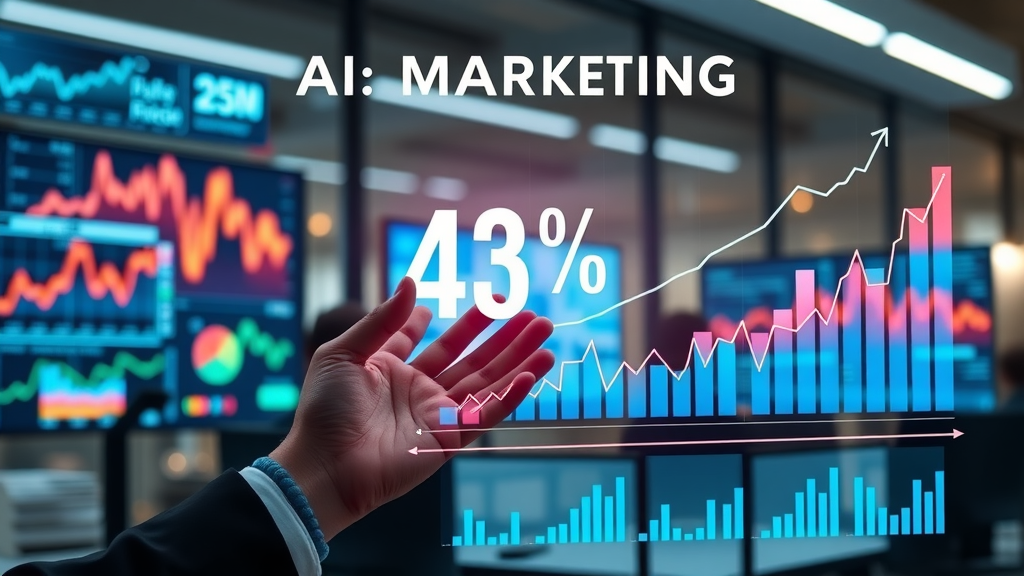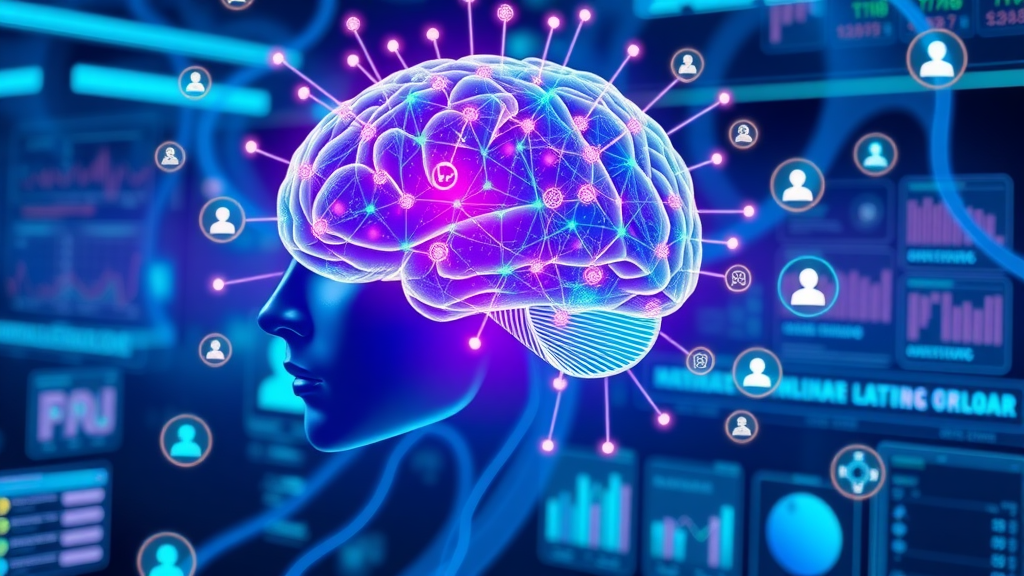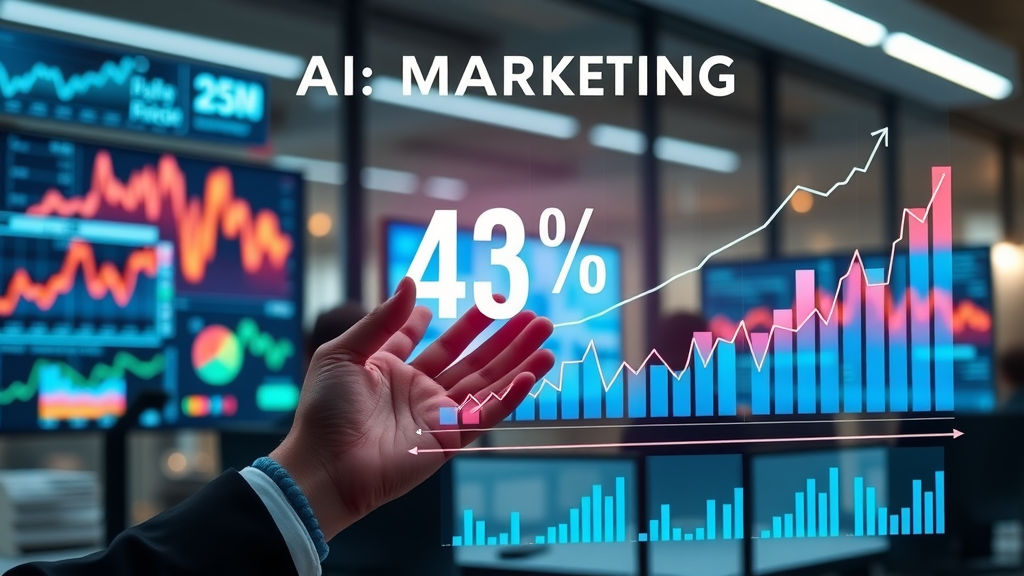Did you know 80% of businesses already use artificial intelligence marketing strategies, and companies leveraging AI in marketing campaigns experience up to a 45% increase in ROI? As the digital market continues to evolve, these numbers highlight just how essential artificial intelligence has become for brands looking to stay ahead. In this article, you’ll discover proven AI marketing strategies, real-world case studies, and actionable frameworks to empower your business. Get ready to revolutionize your marketing strategy and secure sustainable growth in a rapidly shifting digital market.
Artificial Intelligence Marketing Strategies: Surprising Facts Shaping the Digital Market
Artificial intelligence marketing strategies are reshaping the landscape of the digital market in ways that were unimaginable just a few years ago. Today, over 80% of leading marketing teams have adopted AI-powered marketing tools, with more than 60% reporting higher conversion rates from campaigns that leverage machine learning and predictive analytics. These strategies have become the backbone for high-performing brands, streamlining everything from campaign planning to content creation and real-time optimization.
Research shows that artificial intelligence’s ability to process vast amounts of customer data and automate repetitive marketing tasks translates to improved customer experiences and significant savings in operational costs. Businesses that use generative AI and advanced AI tools can shift their focus from cumbersome manual processes to strategic, data-driven marketing initiatives that drive higher engagement and better ROI.
Perhaps most surprising is the speed of adoption. AI marketing is now the standard for high-growth enterprises, triggered by the need for agility in a saturated digital market. As artificial intelligence marketing strategies mature, they are not only transforming how marketing teams operate but are also dictating the pace at which brands can innovate and respond to changing customer needs.

- Discover the latest data on artificial intelligence marketing strategies adoption rates, effectiveness, and ROI in the modern digital market.
- Learn why AI marketing is rapidly becoming the gold standard for high-growth businesses.
Maximizing Opportunities With Artificial Intelligence Marketing Strategies in the Digital Market
Artificial intelligence marketing strategies allow companies to capitalize on data-driven opportunities across the digital market. For example, marketing teams can use AI tools to segment audiences more accurately, personalize content in real time, and automate campaign management to optimize conversion rates. Consider a retail brand deploying machine learning algorithms to analyze customer data and predict shopping behavior. The result? Personalized recommendations that boost sales and improve customer satisfaction.
Real-life insights demonstrate that AI marketing isn’t just for industry giants—smaller businesses see measurable growth when implementing AI-driven marketing campaign tactics. Internal marketing teams or agencies can use predictive analytics to reduce churn, improve customer service, and deliver hyper-targeted ads on social media. This level of precision, made possible by artificial intelligence, creates sustained competitive advantages that shape the entire digital market. As marketing strategies evolve, brands utilizing AI marketing consistently outperform their peers, demonstrating the transformative power of these strategies.

- Practical examples of artificial intelligence marketing strategies that drive measurable results.
- Real-life industry insights into AI marketing adoption and implementation for sustainable growth.
Essential Elements of Successful Artificial Intelligence Marketing Strategies
Understanding the Synergy Between AI Marketing and Marketing Strategy
The synergy between AI marketing and traditional marketing strategy lies in their combined ability to deliver more effective and targeted campaigns. Generative AI and advanced ai tools enhance standard marketing approaches by automating content creation, conducting real-time market analysis, and identifying growth opportunities faster than manual efforts. Marketers who understand this integration can rapidly adapt campaigns to customer needs and market conditions, staying steps ahead in the digital market.
Machine learning enables deep dives into customer data, allowing predictive analytics to anticipate trends, segment audiences, and forecast successful messaging. Marketing teams that embrace these strategies gain access to powerful insights about what drives customer engagement and how to improve campaign results. Key to maximizing these benefits is the strategic use of AI tools within a structured marketing strategy that prioritizes ongoing innovation.
Natural language processing (NLP) is also instrumental. It powers personalized marketing by analyzing customer conversations, reviews, and feedback across platforms. NLP-driven campaigns deliver the right message at the right time—improving conversion rates and ensuring marketing strategies remain relevant as consumer preferences shift.

- How generative AI and advanced marketing tools elevate traditional marketing strategies.
- Leveraging machine learning for customer data analysis and predictive analytics.
- The role of natural language processing in personalized marketing.
Generative AI and Content Creation Tools: Redefining the Marketing Strategy
AI Tools and Content Generation in Modern Marketing
Generative AI has ushered in a new era of content creation, enabling marketing teams to produce high-quality, relevant content at scale. AI tools like ChatGPT, Jasper, and others are now integral to marketing campaigns, generating blog posts, social media updates, and email sequences with remarkable efficiency. These solutions allow brands to maintain an always-on digital market presence without overburdening internal resources.
Artificial intelligence marketing strategies shine in optimizing omnichannel campaigns. AI-driven platforms analyze user behavior data from social media, email marketing, and web analytics to tailor messaging that resonates. By leveraging these tools, businesses can synchronize content across touchpoints, ensuring consistent brand voice and maximizing customer engagement throughout the buyer’s journey.
Case studies continually demonstrate that generative AI outpaces manual content generation. For example, companies using AI for marketing strategy witness faster turnaround, reduced costs, and better alignment with customer preferences. Yet, human oversight remains crucial—blending creative expertise with machine learning ensures content is both compelling and authentic, further elevating marketing campaigns.
- Popular generative AI tools for scalable content generation and content creation.
- Optimizing social media, email marketing, and omnichannel campaigns using artificial intelligence.
- Case study comparison: Generative AI versus human-driven marketing content.
Utilizing Predictive Analytics and Customer Data in AI Marketing
Predictive Analytics: The Backbone of Effective AI in Marketing
At the core of effective artificial intelligence marketing strategies lies predictive analytics—a powerful approach that transforms raw customer data into actionable insights. AI-powered marketing tools mine historical and behavioral data, using AI models and algorithms to anticipate what customers want and when they want it. This allows marketers to design campaigns that meet real-time needs, significantly improving conversion rates and customer satisfaction in a dynamic digital market.
Reducing churn and improving customer retention are two vital outcomes of applying predictive analytics in AI marketing. By identifying customers at risk of leaving, marketing teams can deploy targeted retention campaigns and personalized offers, greatly enhancing customer experience and brand loyalty. These data-driven tactics are now mainstream, giving brands a competitive edge by making every interaction more meaningful and timely.
Recent innovations in customer segmentation and journey mapping use advanced machine learning to further refine marketing strategy. AI tools classify audiences based on hundreds of variables—ensuring that ads, content, and promotions reach the right individuals with maximum impact. As a result, marketing teams enjoy improved campaign efficiency, increased ROI, and a deeper understanding of the digital market landscape.

- How predictive analytics transforms customer data into actionable insights for marketing tools.
- Reducing churn and improving customer retention with artificial intelligence marketing strategies.
- Innovations in customer segmentation and journey mapping with machine learning.
Artificial Intelligence Marketing Tools Overview
A Deep Dive Into Leading Marketing Tools Enhanced by AI
The landscape of marketing tools is rapidly evolving as artificial intelligence redefines the capabilities of every platform. Whether you’re focusing on content creation, campaign optimization, or customer service, there is an AI-powered tool designed for your goals. Products such as ChatGPT provide natural language processing for customer support and content generation. Jasper excels at copywriting automation. HubSpot AI offers smart CRM integrations that empower marketing teams to segment audiences and personalize outreach automatically.
Choosing the right ai tool for your business requires careful consideration. Key metrics include feature sets, scalability for growing customer data volumes, integration with existing marketing software, and platform ease-of-use. The most effective marketing tools combine automation, real-time analytics, generative ai, predictive analytics, and intuitive controls, empowering marketing teams to iterate, test, and optimize marketing strategies seamlessly.
To make informed decisions, compare AI marketing tools based on features, performance, and cost. The table below summarizes leading platform options that are empowering businesses to excel in the modern digital market.
| AI Marketing Tool | Key Features | Price Range | Performance Highlights |
|---|---|---|---|
| ChatGPT |
|
$20-$40/mo | Fast content creation, effective automation, easy API integration |
| Jasper |
|
$24-$99/mo | Scalable copywriting, boosts conversion rates, integrates with CMS |
| HubSpot AI |
|
$45-$800/mo | Comprehensive suite, robust analytics, high ROI for marketing teams |

- Comparing top marketing tool and ai tool options for integrated artificial intelligence marketing strategies.
- Evaluating marketing software and platforms on effectiveness, scalability, and ease of integration.
Integrating Marketing Strategy and AI Tools for Growth
Customized AI-Driven Marketing Strategy Frameworks
Integrating artificial intelligence marketing strategies with your organization’s core marketing strategy is the key to unlocking growth. Start by mapping business goals against available AI tools, such as generative AI-powered platforms for rapid content creation or machine learning models for campaign forecasting. Frameworks should enable seamless data exchange among departments, nurturing a culture of agility and innovation throughout the marketing team.
Business success with AI marketing depends on aligning strategic objectives with the right technology. For example, if customer engagement is a primary goal, prioritize AI tools offering advanced personalization. Conversely, if your marketing strategy emphasizes cost reduction and efficiency, focus on automation and predictive analytics. Standardize marketing workflow integrations and invest in continuous training to keep pace with rapidly evolving ai models.
Adopting best practices such as agile deployment, iterative testing, and regular feedback ensures your AI marketing strategies deliver consistent results. Remember, the ultimate aim is to create an adaptable, forward-thinking marketing organization—ready to capitalize on new digital market opportunities as technologies advance.
- Frameworks for fully integrating artificial intelligence marketing strategies across the digital market.
- Aligning business goals with advanced marketing tools and generative AI solutions.
- Best practices for seamless AI marketing enablement.
AI Marketing in Action: Social Media, Targeting, and Personalization
Applying AI Marketing Techniques Across Social Media
AI in marketing has revolutionized social media by making customer experiences more personalized and impactful. Machine learning and natural language processing empower brands to analyze millions of customer interactions in real time, identifying trends, sentiment, and emerging opportunities. Marketing teams now design campaigns that adapt content and timing for different segments—ensuring the right message reaches the right person, precisely when it matters.
Personalization at scale is perhaps the most impressive outcome of artificial intelligence marketing strategies. AI tools automatically create dynamic ad creatives, recommend products, and determine optimal social media posting schedules. For example, brands like Netflix and Spotify use advanced AI algorithms to recommend tailored content, setting the gold standard for customer engagement in the digital market.
There are countless examples of AI-generated campaigns that have transformed the business landscape. Brands regularly launch social media contests, influencer partnerships, and real-time customer service initiatives, all powered by generative AI. These strategies increase brand sentiment and foster deeper connections as marketing campaigns feel more relevant, timely, and impactful.

- Using machine learning and natural language processing for hyper-targeted social media experiences.
- Personalization at scale: Delivering the right message at the right time with AI in marketing.
- Examples of AI-generated campaigns that shaped the digital market.
Ethics, Data Privacy, and Responsible Use in Artificial Intelligence Marketing Strategies
Navigating Data Privacy Challenges With AI Tools and Customer Data
As organizations accelerate their adoption of artificial intelligence marketing strategies, data privacy emerges as a top concern. Secure collection, storage, and processing of customer data must align with regulatory frameworks such as GDPR or CCPA to avoid legal challenges and maintain customer trust. AI tools should incorporate privacy-by-design principles, encrypt sensitive information, and provide customers with transparency and control over their data.
Building a trustworthy digital market presence requires a balance between innovation and responsibility. Marketing teams need to stay informed about evolving data privacy regulations, updating processes and AI models regularly. Establishing clear guidelines for ethical decision-making helps ensure AI in marketing respects users’ rights while delivering personalized, relevant content and services.
“The future of marketing strategy relies on responsible, transparent use of machine learning and customer data.” – Digital Market Thought Leader

- Key considerations for secure and ethical use of marketing tools leveraging AI.
- Regulatory landscape and frameworks for trustworthy artificial intelligence in the digital market.
Emerging Trends: What’s Next for Artificial Intelligence Marketing Strategies?
Predictive and Adaptive Marketing Tools
The next wave of artificial intelligence marketing strategies is powered by predictive and adaptive marketing tools. These advancements use generative AI to constantly analyze changing customer behaviors and market trends, automatically updating content and campaigns for maximum relevance. Expect more brands to embrace AI tools that provide real-time feedback loops—enabling fast pivots and continuous marketing optimization.
Integration of Multimodal AI in the Digital Market
Multimodal AI blends image, video, audio, and text processing, elevating customer engagement across e-commerce, social media, and omnichannel campaigns. Marketing teams now design immersive experiences that adapt dynamically to user inputs. Future-ready marketing strategy frameworks will empower brands to contextualize all forms of customer data, fueling deeper personalization and even higher conversion rates as the digital market matures.
- Enhancing social media, e-commerce, and omnichannel marketing with multimodal AI solutions.
- Future-ready marketing strategy tactics and frameworks powered by artificial intelligence.

- How generative AI and adaptive marketing strategies are evolving.
Case Studies: Best Examples of AI in Marketing
How Leading Brands Are Powering Their Digital Market with Artificial Intelligence
Global brands like Coca-Cola demonstrate the power of generative AI marketing strategies. Their AI-driven campaigns span dozens of markets, using predictive analytics to forecast demand, optimize messaging in real time, and deliver uniquely personalized experiences to millions of customers. As a result, Coca-Cola has achieved higher conversion rates, stronger brand loyalty, and better campaign ROI at unprecedented scale.
Retail, fintech, and B2B sectors are also at the forefront—leveraging ai marketing tools to automate customer service, launch personalized offers, and map dynamic customer journeys. For example, retailers use machine learning to manage inventory and personalize product recommendations, while B2B companies deploy AI tools for smarter account-based marketing. The digital market is evolving rapidly, and these brands are setting the standard for innovation by integrating AI into every facet of their marketing strategy.
“AI marketing isn’t the future — it’s the present for every high-performing marketing strategy.” – AI Marketing Analyst

- Coca-Cola’s use of AI and generative AI for global campaign optimization.
- Retail, fintech, and B2B sectors revolutionizing their marketing strategies with AI marketing tools.
How to Build and Implement Artificial Intelligence Marketing Strategies
Step-by-Step Guide to AI Marketing Integration
- Assessing organizational needs for artificial intelligence in marketing
- Selecting, onboarding, and training with top marketing tools and ai tool platforms
- Measuring success and optimizing ongoing strategies with generative ai and machine learning
- Maintaining data privacy and compliance through each stage

Video: Artificial Intelligence Marketing Strategies in Practice
- Watch a demonstration of AI marketing tools improving campaign ROI and customer engagement.
Video: Expert Analysis on the Future of AI in Marketing Strategy
- Hear from digital market leaders on generative AI innovations and the next marketing strategy revolution.
People Also Ask: How can AI be used for marketing?
AI in marketing is used for customer data analysis, predictive analytics, content creation, marketing automation, and campaign personalization. Modern marketing tools utilize machine learning and natural language processing to optimize targeting, improve ROI, and automate repetitive tasks.
People Also Ask: What is the best example of AI in marketing?
A leading example is generative AI automating social media content at scale, like Coca-Cola’s AI-driven campaign customization. AI-powered marketing tools also enable hyper-personalized email campaigns and real-time customer engagement.
People Also Ask: How does Coca-Cola use AI in marketing?
Coca-Cola uses artificial intelligence marketing strategies to power generative AI for content creation, optimize real-time social listening, forecast demand, and drive personalized marketing strategy across markets, leveraging advanced machine learning and predictive analytics tools.
People Also Ask: How to do digital marketing using AI?
To do digital marketing using AI, businesses integrate AI-powered marketing tools for customer segmentation, content creation, predictive analytics, and automated campaign management. Effective marketing strategy aligns business goals with artificial intelligence to maximize efficiency and ROI.
Key Benefits and Takeaways of Artificial Intelligence Marketing Strategies
- Drive measurable growth in the digital market with data-driven, automated marketing strategies.
- Leverage machine learning and generative AI for superior customer engagement and retention.
- Mitigate data privacy risks while ensuring marketing strategy effectiveness.
- Stay ahead in an increasingly competitive digital market with AI marketing innovation.
Frequently Asked Questions: Artificial Intelligence Marketing Strategies
What industries benefit most from artificial intelligence marketing strategies?
Almost every industry benefits from artificial intelligence marketing strategies, with particular success in retail, finance, insurance, healthcare, and e-commerce. AI-powered marketing tools help businesses in these sectors personalize campaigns, automate content creation, and predict shifts in customer behavior, resulting in higher conversion rates and improved ROI.
How do AI marketing tools protect customer data privacy?
AI marketing tools protect customer data privacy by employing encryption, anonymization, and compliance with regulations like GDPR and CCPA. Leading marketing platforms incorporate privacy-by-design principles, regular audits, and give customers control over their data usage, ensuring secure and ethical AI-driven marketing campaigns.
Can small businesses leverage AI in marketing?
Absolutely. Many AI tools are accessible, cost-effective, and require little technical expertise, allowing small businesses to automate marketing efforts, personalize content, and monitor performance in real-time. This levels the playing field and enables smaller brands to compete alongside major players in the digital market.
What are the challenges of integrating generative AI into existing marketing strategy?
Common challenges include selecting the right AI tools, training the marketing team on new processes, ensuring data quality, and maintaining ethical and transparent data practices. Success requires organizational buy-in, ongoing monitoring, and a willingness to continually adapt strategies as new technologies emerge.
Summary: The Future of Artificial Intelligence Marketing Strategies in the Digital Market
- Artificial intelligence marketing strategies are transforming how brands connect with their audiences, delivering greater value and measurable impact.
- With the right mix of AI tools, ethical frameworks, and marketing strategies, businesses can position themselves at the forefront of the digital market evolution.
- Explore, implement, and optimize your marketing with leading AI marketing innovations today.
Take the next step: Invest in artificial intelligence marketing strategies to future-proof your brand in the digital market!
Artificial intelligence (AI) is revolutionizing marketing by enabling businesses to analyze vast amounts of data, automate tasks, and deliver personalized experiences. To effectively integrate AI into your marketing strategy, consider the following approaches:
1. Predictive Analytics for Consumer Behavior
AI-driven predictive analytics utilize historical data and machine learning algorithms to forecast future consumer behaviors and trends. This allows marketers to anticipate customer needs and tailor campaigns accordingly. For instance, Starbucks’ “Deep Brew” AI initiative analyzes transactions, mobile app data, and even weather patterns to predict consumer preferences, enabling the company to plan seasonal offerings and anticipate market trends. ( numberanalytics.com )
2. Personalized Marketing Solutions
AI enables advanced customer segmentation based on behavior, preferences, and demographics, allowing for highly personalized marketing messages. Techniques such as behavioral segmentation and lookalike modeling help in delivering tailored content and offers. For example, AI can dynamically modify website elements, emails, and ads in real-time to provide personalized experiences to individual customers. ( web.com )
3. Content Creation and Optimization
Generative AI tools can automate content creation, producing high-quality, relevant content at scale. These tools assist in generating blog posts, social media updates, and email sequences efficiently. Additionally, AI analyzes user behavior to optimize content, ensuring it resonates with the target audience. For example, AI can analyze heatmaps and engagement data to optimize website layouts and copy. ( benchmedia.com )
4. Marketing Automation
AI automates repetitive marketing tasks, such as email marketing and social media management, saving time and resources. AI-powered tools can analyze social media data, identify trending topics, conduct sentiment analysis, and optimize content scheduling and distribution. This allows marketing teams to focus on strategic initiatives while AI handles routine tasks. ( web.com )
5. AI-Enhanced Advertising
AI optimizes advertising efforts by analyzing large amounts of data and making real-time adjustments to bids, targeting, and ad content. AI can identify the most effective keywords, optimize bidding strategies, and improve ad targeting to enhance conversion rates and minimize costs. Additionally, AI can be used for ad creation and testing, helping businesses create more impactful ad copy and creative that resonates with their target audience. ( socialbee.com )
By implementing these AI-driven strategies, businesses can enhance their marketing efforts, improve customer engagement, and achieve higher returns on investment.

